Ai Weiwei opens his home in the Alentejo for the first time and he does it for Condé Nast Traveler Spain, what a great honor, with a presence that radiates simplicity and wisdom at the same time. A lot.
A year ago he decided to move to Portugal, although he maintains his studies in Berlin and Beijing, and here he was received with such open arms that at this moment two great exhibitions can be visited, rapture, in Lisbon, one of the biggest retrospectives of him to date, and Ai Weiwei: Intertwine at the Porto Serralves Foundation , which will remain open until the summer of 2022.
Following a dirt road, we arrive at the Alentejo refuge of this artist, activist and, above all, humanist, to live a relaxed and unforgettable talk.
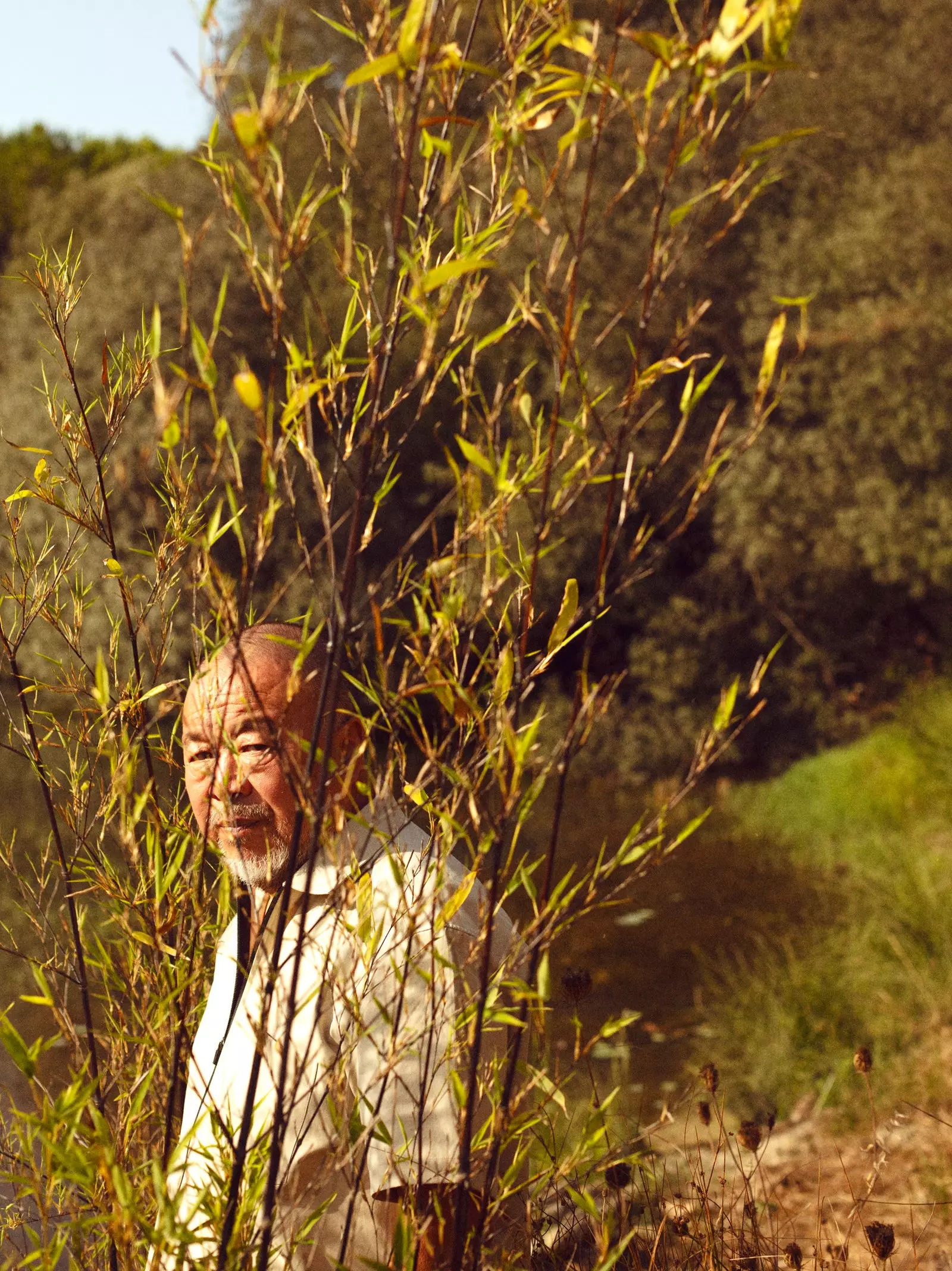
CNT. Thank you for receiving us in your home. The first question is obvious, since it is surprising that an artist like you chooses a Portuguese town after living in Berlin. What did you expect to find here?
A.W. The truth, I arrived in Portugal without having any knowledge of the country. Absolutely none. I grew up in communist China and the funny thing is that my father, the poet Ai Qing, received a medal from the president of Portugal many years ago (Note: in 1995, President Mário Soares awarded Ai Qing the Ordem da Liberdade), which he presented to him at the Portuguese embassy in Beijing. That's all I knew about Portugal.
I have lived in Berlin for the last five years before I moved here, but in the end I started to feel some discomfort, because the winter in Berlin is too long. And I don't like that the days are always grey, it saddens me. I think I am an emotionally weak person.
CNT. No, that can't be true.
A.W. Yes, because the weather or people's attitude affect me a lot. That's the truth. I am affected by nature and human nature. In Berlin, obviously, nature is not the most noteworthy. Summer is nice, but winter is too long and it gets dark too early.
Of course there are even worse places, but also the people in Berlin are tougher. Maybe because I'm old, when I walk down the street I don't want someone to yell at me. from a bike or seeing taxi drivers cursing at another guy riding that bike. I think it's too much. I wonder: “What will they want? Why are you in such a hurry?"
CNT. And in Portugal there is not such a rush, right?
A.W. I know, I am aware. When I arrived, the first thing I noticed was the abundance of sunshine, as it is today and 300 other days a year. What can you complain about? Nature is so generous, it gives you everything for free. And I'm getting older, so I need somewhere to settle down. For sixty-odd years I never owned a piece of land , a piece of earth. I recently thought that I had never felt the need to own a key.
Because I never thought I had something to lock up. It is the feeling of living in a hotel or somewhere you rent. Suddenly I understood that I could buy a farm, a piece of land, and I found this beauty already ready. Like a “ready-made”. In fact, it was the first house I saw.
CNT. Really? Not even a hint of doubt?
A.W. So it was, at the same moment, when perceiving its beauty and verifying that the qualities were good. The owner received us and I asked her: “How long has the house been available?” She said, “I think it's been about two years since we decided to sell it. My children are now adults and we no longer needed a place like this on vacation.” So I asked him: "Can I see the rooms?" “Yes, she,” he replied, There are four bedrooms, all with bathrooms.
I thought it fit my idea, since I always contact collaborators who come to work with me and so each one could have their privacy. So I replied that I wanted to buy it. She didn't believe him: "Really?" I told him: “Yes”. And that's how I moved here. Shortly after, one Saturday I went to the Montemor-o-Novo market, the typical one with stalls of fruits and vegetables, of local products.
In one of them, a lady spoke to me: “Thank you for being here, but I have a question: why did you choose Montemor? ” Suddenly I felt what intrigued him: “Oh, right… when people choose a place, they always have reasons, strong reasons”. But in my case I am basically going by my intuition and I can't give a clear reason, so I replied: "Maybe I'll find out after a while." Now that I have lived in this place for a whole year, during this pandemic, I feel like I grew up here.
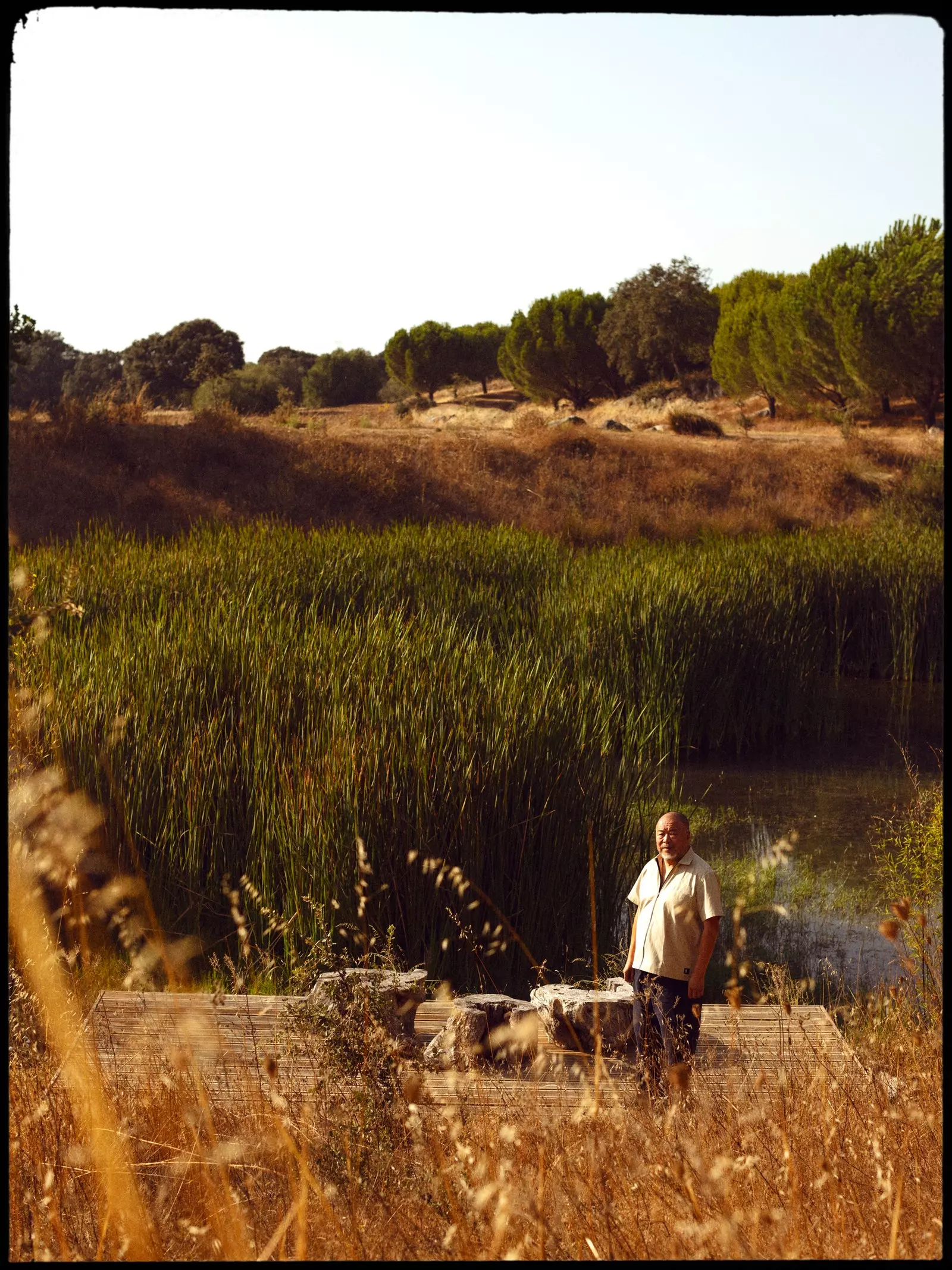
On the dock of the small lake where he likes to walk every day.
CNT. Do you really feel like you're from here?
A.W. Yes, I don't feel like a foreigner. It's because I grew up in a very remote area, where there is no one. I can show you a picture, it is very interesting.
A.W. See this? People are often speechless, asking me if I'm serious. I tell them that it is real, that I spent five years there with my father, my mother and my brothers. My father was exiled as a poet and sentenced to forced labor in Xinjiang. That's why I feel like I can't complain if I come from there. I have no complaints.
I always feel comfortable everywhere. I always think that I can live anywhere. But Portugal, clearly, is not just any place. It is a very safe place and gives the feeling that it has not been altered by external elements. People are very open minded. They are kind, they come to see you to say how much the works of art have moved them and they thank you. That is more than enough for me. It's very nice. On the other hand, sometimes I go to the beach.
CNT. We're not far from the coast, are we?
A.W. If you drive forty minutes or an hour you arrive at very beautiful beaches. Beaches where there are not even footprints in the sand. It's so empty and so beautiful that you can't believe it. In other places, any beach like the ones here would be full of tourists. Of course, there is the issue of the pandemic, but even without a pandemic They are very quiet places.
You kind of feel like you're on a private beach, but it's not, there's just plenty of space. Sometimes we also go near the Vasco da Gama bridge, in Lisbon, in the Tagus estuary. When the tide is out there is a huge area of shallow water where people walk and you see all these crabs, clams, birds... Everything is very nice. I have never seen nature like this.
Maybe the reason is that in Portugal they did not have a very advanced industrial revolution And I think in a way that has been lucky. Also, Portugal was not so involved in World War II, so that helped maintain its own tradition and mentally the trauma of that horror was not so much suffered. I think that is very important: keep your own ways, your own tradition.
CNT. True, in Portugal there is an identity, a way of living of its own.
A.W. And there are not so many fights. Even in Europe in the last hundred years there have been fights and wars between nations. I think they've been pretty lucky here in that regard.
CNT. Regarding traditional Portuguese architecture, don't you think that because of that
late industrial revolution, small towns and popular architecture have been better maintained?
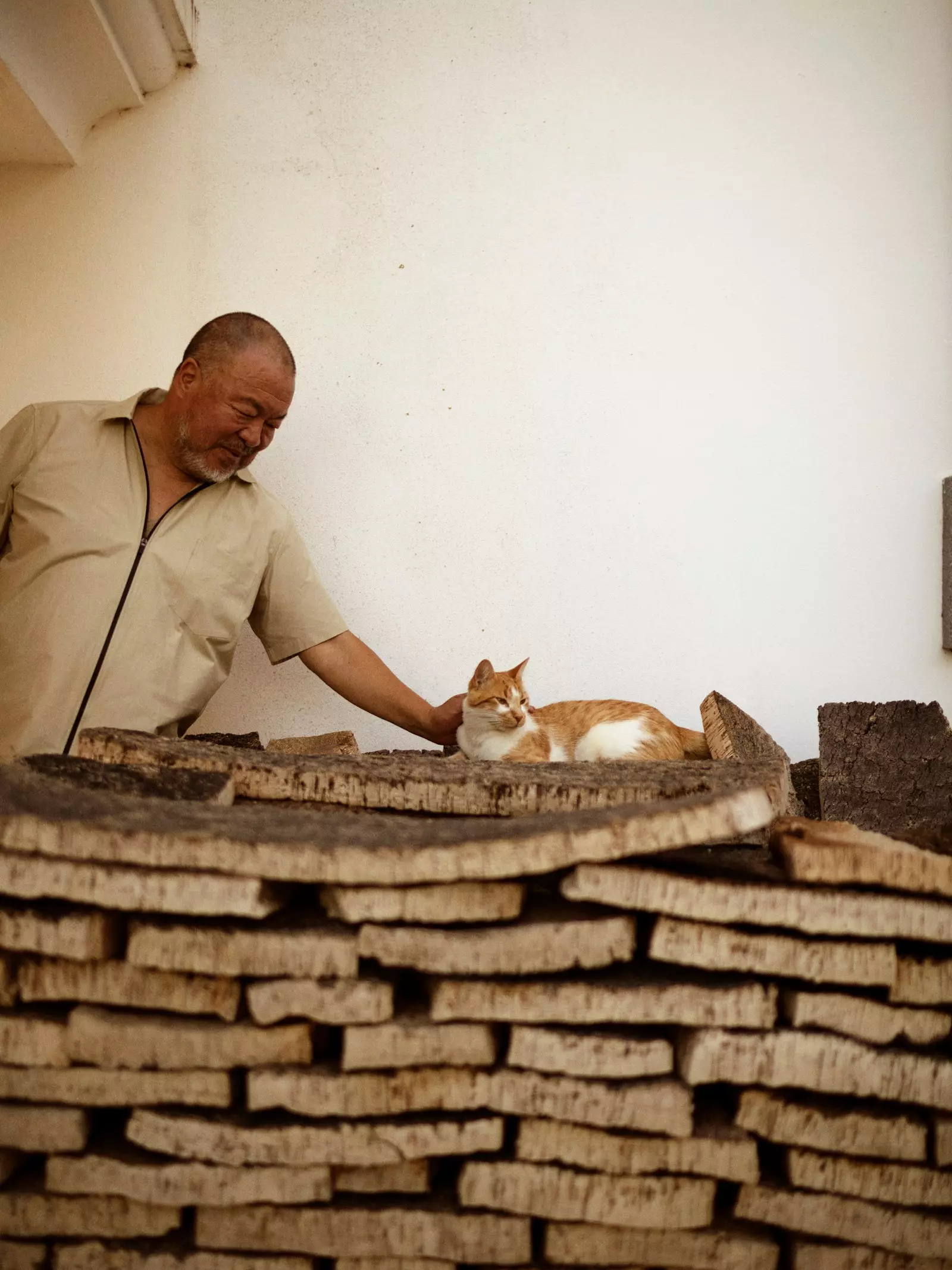
Ai Weiwei petting his cat.
A.W. Without a doubt, there are many beautiful things to be seen here.
CNT. What other places in the Alentejo, besides Montemor-o-Novo, have caught your attention?
A.W. Évora is a very beautiful city: the architecture, the market, the restaurants... it's all incredible. I really like going to the markets and flea markets of the places I visit because they reflect the history of the place. They show how humans behaved in the past. You see many things that are no longer used and are sold. You try to imagine that moment, what their lifestyle was. and normally here you do not negotiate with them, there is no haggling , since they give you a honest price.
CNT. Here there is that anachronistic sensation, of historical places and fixed to their own identity.
A.W. I think that here, unlike other places, No attempt has been made to “glamorize” or make up the identity of the place. The past is very present. Things are old, old, but they have their dignity that way. I don't like cities that want to modernize everything. Make it all the newest. So that? To live in a real estate market? I dont know...
CNT. Speaking of traditions, have you liked working with tiles and collaborating with Viúva Lamego? (Note: Ai Weiwei chose Sintra's century-old factory Viúva Lamego 1849 to recreate his work 'Odyssey' (2016). It produced a panel with around 1,800 hand-painted tiles for the artist's exhibition in Lisbon, 'Rapture' ).
A.W. I have a great interest in porcelain and ceramics since the seventies. My compatriots make superfine quality porcelain. So here I saw the tiles and I understood that there is a tradition. I like working with them. Always I try to integrate different types of language to give tradition a new interpretation. the factory Viuva Lamego it is impressive and they were willing to meet the challenge.
CNT. The panel is beautiful. And you also worked with cork.
A.W. Yes because cork is a very special material. It is a type of material like no other. It is as if nature produced a plastic. And it never rots. You put it in water and it doesn't rot. It is waterproof and an insulator of electricity. It is a very special material that I am still investigating. Y Alentejo also has its own beautiful marble.
CNT. At the Lisbon exhibition I saw your piece ‘Pendant (Toilet paper)’, the giant roll of marble toilet paper. Is it Alentejo marble?
A.W. Of course. The Portuguese company B Stone produced it. It has been very easy to work with them. They accepted new ideas and wanted to face the challenge, they were very kind. I have met many businessmen but unlike other places here you don't have to pay first and all that. They are more interested in doing it and then ask you to pay and give you an honest price. It is a correct way of doing things. Not everything is so commercial and the feeling is more pleasant.
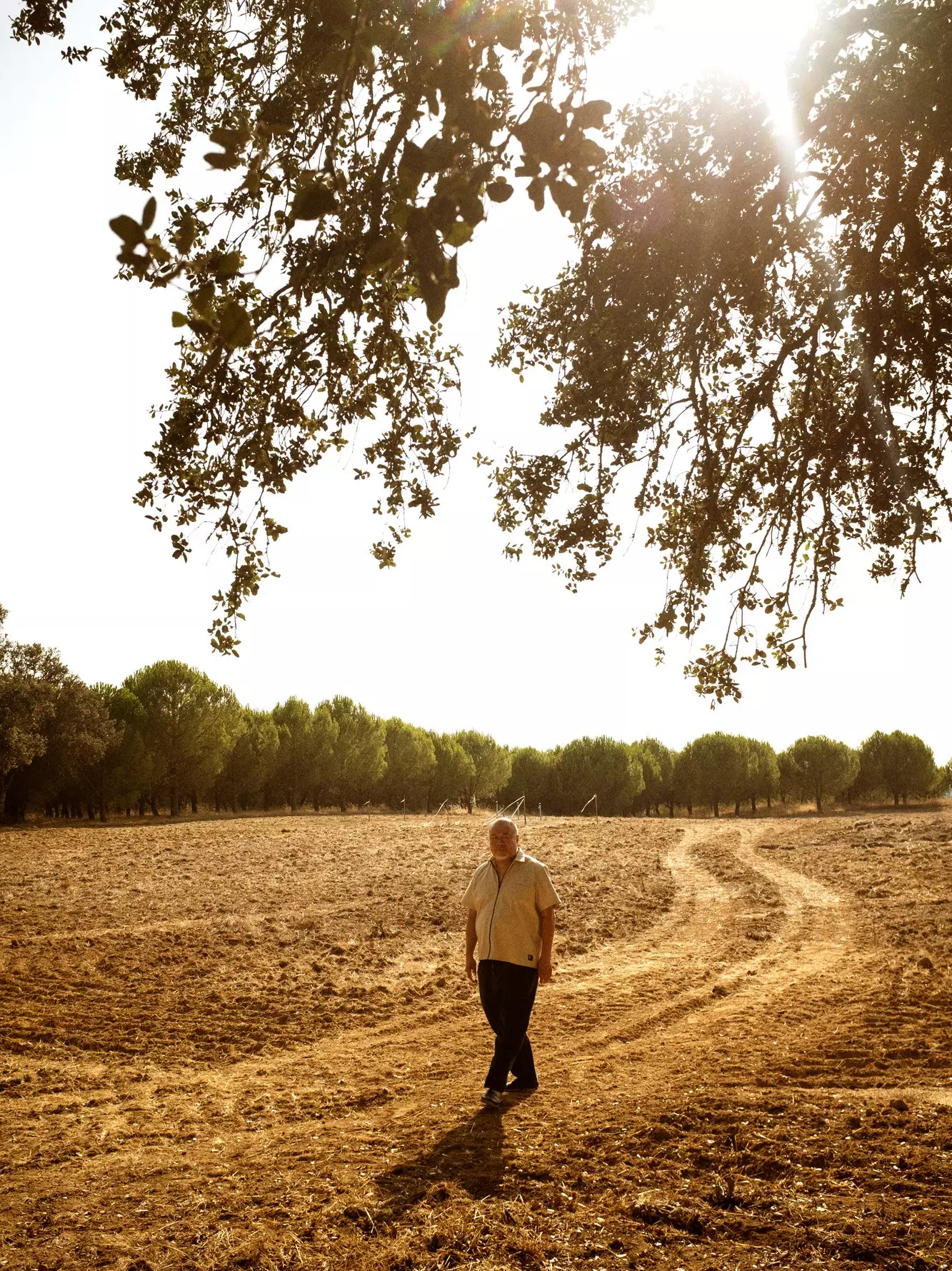
Under the Alentejo sun.
CNT. Tell us your routine. Do you live in the countryside a lot?
A.W. I stay here pretty much all the time. When I open the windows in the morning and I see the sun enter, I have a great feeling. And at the same time so many things to do... Today, for example, I spent a lot of time on the computer. It's not my favorite plan, but we can't help it with all the information and communication that's coming. After working in front of the screen, I open the window and contemplate all this nature. It wouldn't be the same if I looked behind the glass and saw a day as gray and dark as the screen itself.
CNT. Do you walk a lot?
A.W. Yes, I try to balance things. I go out and try to do more walks. By having a few hectares here on the land, I have that opportunity. Even if it's just for a ten minute walk. It's so peaceful. Every day when the sun goes down I contemplate the beautiful colors of the sunset. And the view reaches far, very far. You can see the edge of the empty land, with no trace of buildings. I don't see buildings from any side of the house. That is the luxury of my life here.
CNT. And the Alentejo cuisine?
A.W. We just had lunch. Today we have eaten sardines and shrimp. Very, very good. I love the simple cooking of the shrimp, which has a different flavor here. The food here is simple and good, like some grilled sardines with a little salt. And shrimp can be simply boiled or fried. Then there is, of course, the “bacalhau”.
CNT. Do you like cod?
A.W. Yes, because every time you eat it is in a different way, they cook it in infinite ways. It can be in the oven, with rice, as a salad... No matter how you cook it, it's always good.
CNT. Well, many foreigners do not like cod.
A.W. I think cod is essential to know if you like living here or not. And I love it.
CNT. And the seafood? I've seen a picture of you eating barnacles.
A.W. Barnacles! At first it is a challenge due to its appearance, but the taste is very pleasant, tender, juicy. The seafood is generally very good here, but I especially like the fish stews. And how they cook the fish using the head of the fish itself. there is a small restaurant on the beach, in Nazaré, called "Oh Louis." They cook very well. It's like a family. Every time you order the same dish they give it a little differently.
That's being family, right? I don't really have any complaints because with western food sometimes you have a fixed idea. If you live in the United States you eat salad or something similar, but not here, here there really is a very varied homemade cuisine . And it's all local, with different ingredients that vary depending on where you are.
Here in the Alentejo it is sunny during the day and cold at night , that allows fruits and vegetables to taste so good. In the garden we have some fruit trees. Orange trees and persimmons, for example. And we grow other vegetables. Also, like I told you, We go to the market a lot.
CNT. You have already traveled to Lisbon and Porto. What did you think?
A.W. Porto and Lisbon are very different cities. The climate, for example, is very different. Also here in this area of Alentejo where I checked that it is the hottest place in Europe in summer. It's almost five or ten degrees warmer than other places, so my friends joke that there is an even hotter place, the Sahara . Some days are too hot here, but I love it.
CNT. Don't you mind the heat?
A.W. No I don't mind as it is dry and not constantly hot. The night is cool, there is always a bit of wind and you usually have to sleep wrapped up in a blanket. I'm lovin 'it. Being non-humid suits me and reminds me of where I grew up, Xianjiang.
CNT. What did you think of Porto?
A.W. Beautiful and very special. I was impressed with the Serralves museum. I had never had an exhibition there before. They put all that culture together and they did it really well. And they can boast of that great garden.
CNT. Did you visit the art deco villa?
A.W. Yes, I was able to visit it in its entirety. Its architecture is impeccable , and the owner had to be a person with strong tastes that he expressed in a great way. Casa Serralves has become an art deco landmark that the Serralves Foundation manages very carefully.
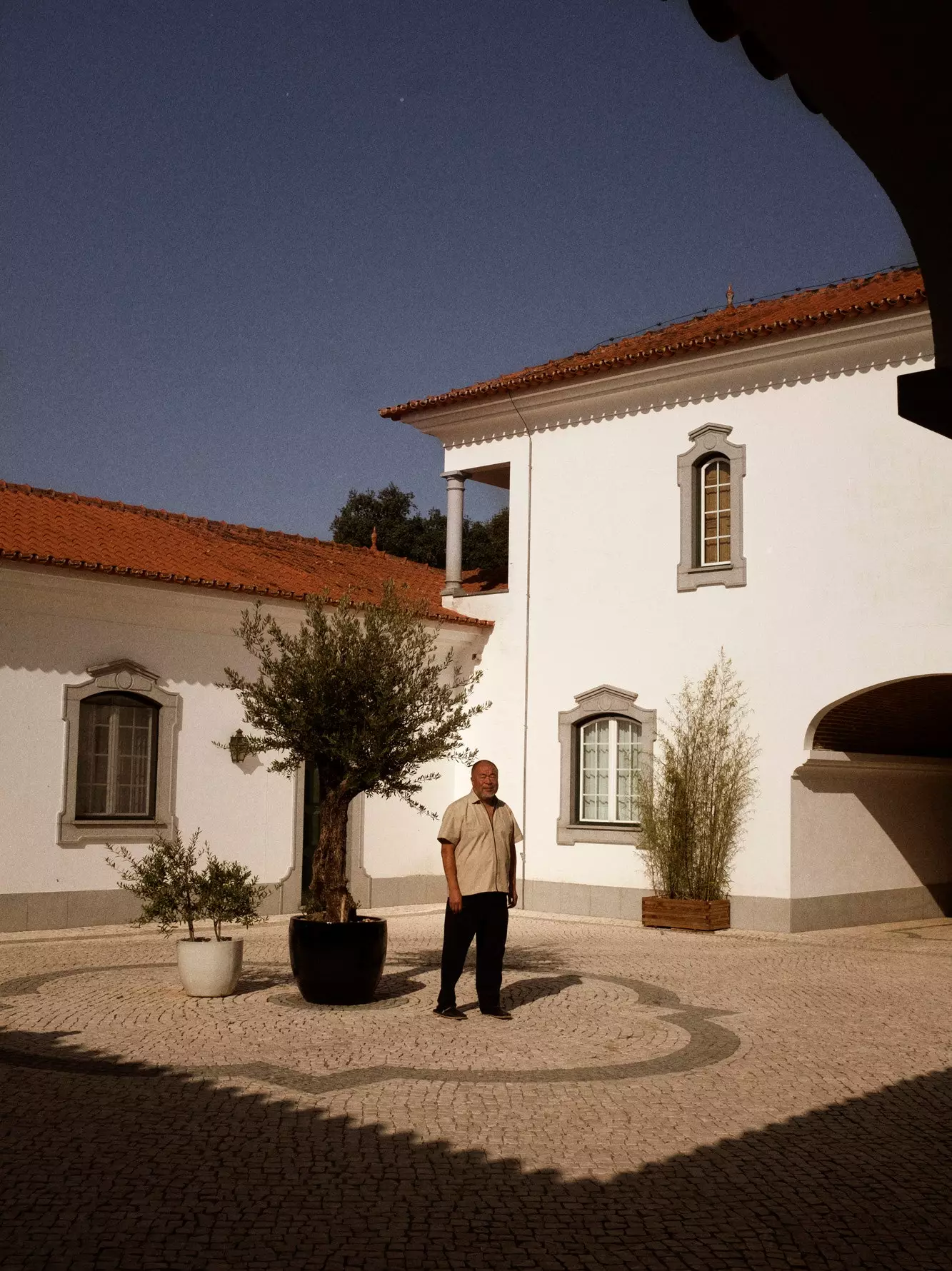
Ai Weiwei in the courtyard of his house, with architecture clearly influenced by Alentejo, and located near Montemor-O-Novo.
CNT. Since you are an architect yourself, what do you think of the work of Portuguese like Álvaro Siza Vieira?
A.W. Oh I love it! I follow his architecture for a long time. His work impresses me deeply. I went to this restaurant, House of Chá da Boa Nova, not far from the swimming pool (Piscina Municipal de Leça da Palmeira) and I could feel the thought of him. But it is his modernity that is striking. And he was so young, he was twenty years old! To imagine being given those opportunities and him expressing himself so well... Giving someone under 30 the freedom to let his idea come to fruition is an incredible thing. So that means that not only him, but also society was open enough for that.
CNT. What impression does the current Portuguese society give you?
A.W. The people here are sincere and very knowledgeable about their culture because they are confident in their lifestyle, which is so unique. They are not ashamed, they are proud of their tradition. They are comfortable here. That is important. In big cities, people are quite insecure and hesitant. And nervous. The people here exude tranquility, they know what they are doing. I feel very safe in this environment, in a society that is enriched by its mixture
CNT. Do you think so? Is it multicultural?
A.W. If you look closely you can see it right away. I don't know when or how, but they are Very mixed with other cultures. There are times when you can believe that you are in New York. The attitude of people dealing with difference is so neutral. I think it is very positive and something that does not happen in countries like Germany, France and England , where you can see that people are snobs with some group, or look down on others. Not here. This is very important. It is acceptance. They are well accepted. They think you are part of them.
CNT. And they love incorporating foreign elements into their culture. Don't you think?
A.W. Maybe. Because they are integrating many Chinese now (laughs).
CNT. The Portuguese were in China, Africa and India, for example, and incorporated elements of those cultures. In the case of food, it can be seen in some ingredients.
A.W. Even sugar (laughs).
CNT. Or the porcelain. Look at Vista Alegre, with a clear Chinese influence. Or the architecture. For example, the shapes on some traditional roofs could be Chinese, right? In the style of a pagoda?
A.W. Yes that's how it is! Even here when my friends come, and they see the roof of the house, they say, "Did you design the roof?" I tell them no, that it was already like that. I don't know why it has this shape.
CNT. Because in the 15th and 16th centuries the Portuguese traveled the world and incorporated many things they saw abroad into their culture.
A.W. It was undoubtedly the globalization of the fifteenth century. And it was Portuguese, that's right.
CNT. Recommend us a museum.
A.W. I visited a newly opened museum in Lisbon and was impressed. it was called BMAD (Berardo Art Deco Museum). The art deco collection and details were impressive.
CNT. Are you curious to know other areas of Portugal? For example, the island of Madeira?
A.W. I don't even know where Madeira is (laughs). I am like a peasant who tends the garden. Now, for example, I would like to change it, let it be a more botanical garden without a lawn. Grass is so boring! I would like to put more natural, local plants. Different types of plants. I don't want to have this uniform grass. This is not a Lincoln Memorial, this is Portugal (laughs). But I just moved here a year ago and everything takes time. It needs a few years to make it more my home. It takes time.
You have to understand that patience comes from an agricultural society. Because everything you grow takes time. People today have no patience and, if they live in the city, they want an answer the next day. And what do they get? get depressed This whole concept drives people crazy. Every day new emails, replies and the pressure to respond immediately. Of course I'm exaggerating, but what is really nice is being and living here. Have patience. Let them work.
CNT. I see there is a big cage with some birds. Do you like having birds here?
A.W. The truth is that no, but they were already. When you live here you want to be surrounded by nature and animals. We have laying hens and also foxes They come almost every day. One day they took seven chickens! The foxes come because there is food and even by building non-aggressive fences they continue to come.
There are also moles and porcupines . Our neighbor has donkeys and many cows. The truth is that this is farmland. Also there are many frogs and some snakes, but they are not poisonous. We never kill them, if they come to the garden we just move them. You know, this is their land. They belong to this place. We are only travelers, we are passing through.
CNT. I know that poetry is very important to you, especially because of your father. Have you had the opportunity to discover Portuguese poetry?
A.W. They gave me a book of poetry and also one of Saramago , but I haven't had a chance to read them yet.
CNT. I imagine you have been very busy with your work.
A.W. Yeah, but that's not a very good excuse, is it? You know, my life is poetry anyway, so... I am making my own poetry.
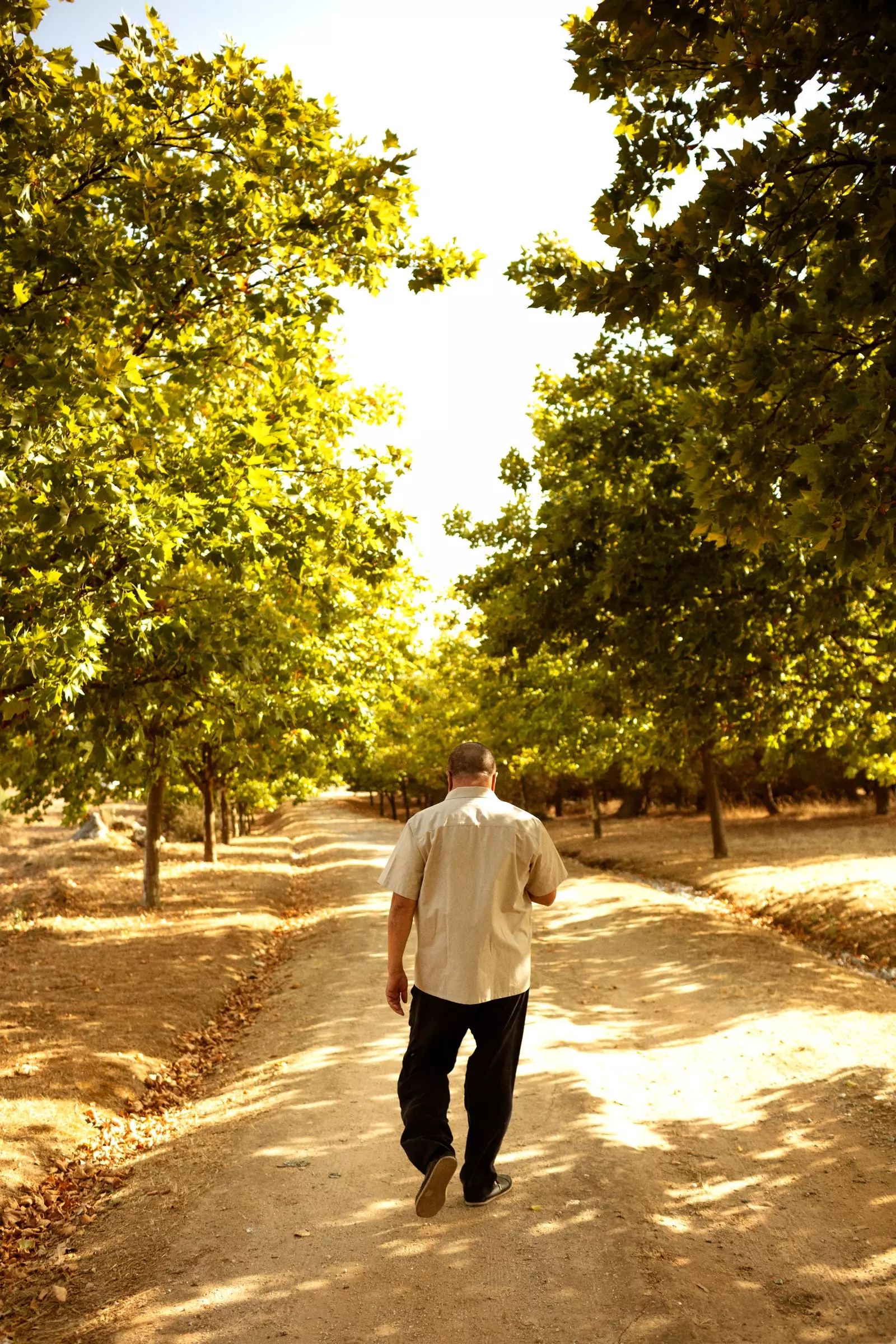
of walk.
CNT. Do you write poetry?
A.W. My work is my poetry. Whether we like it or not life is poetry . And it's always giving us a surprise and it's going to end as a surprise.
CNT. Don't you think this country has that spirit, see the poetry of life?
A.W. For me, the connection with nature is the strongest point of Portugal . My father, during his lifetime, wrote three or four long poems about the sun. I can sense how grateful he was and how much he got from the sun. I respect him for doing that. Poets always talk about the sun. It's a classic theme. We always have to remind ourselves of our condition. The sun gives us life, a miracle that will not necessarily be so in the future. The sun can get very hot, right? And life, disappear.
CNT. That is a fragile condition of the human being.
A.W. Very fragile. We are lucky to still be here. And to think how people exploit nature so much. It is horrible so much greed only for profit. It ruins everything.
CNT. We are already paying for it.
A.W. And it's suicidal. We deserve to pay, because this is too much. Nature can't take that much. So many species that they simply disappear. It seems to me that it is not so complicated to understand this simple fact. If you take a little, it's fine. But, if you take too much, it's not. And, anyway, for what so much?
CNT. That's right, and if you live simply you contribute to improving it.
A.W. Simplicity is the deepest philosophy that a human being can follow and understand. We need a simple life. You cannot think that you are too clever, that you can cheat nature. It's like playing tricks in the game. What about war and similar horrors? Deep down, I realize you have to be as simple as the honest peasants. There are people who make fun of them, but they are the wisest.
Apart from your beloved cats , Weiwei has dogs, d he puppies of a local breed, Rafeiro Alentejano. “They are two months old and I love them,” he says. “They are going to be great. They are a female and a male. During the day they sleep a lot and at night they watch the house. It is nice." Do they get along with your cats? "They're trying..."
The 15,740 residents of Ai Weiwei
The artist and now illustrious neighbor has not put Montemor-O-Novo on the map... because whoever knows Alentejo knows that Montemor-O-Novo It was already very well put in its place. And not just because It is a must stop on the A6 –the motorway that connects Badajoz and Lisbon– beyond the very obligatory in Evora, World Heritage City located thirty kilometers.
In fact, During the 15th and 16th centuries, Montemor-O-Novo was the residence of different kings , which brought the Church here with the foundation of up to eight convents and four parishes. From that glorious past remain today a beautiful castle that dominates the town from above, the Saudacao Convent , with its portico of baroque tiles, the Church of Mercy , which houses a 15th-century polychrome marble Pietà, or the Calvary Church , with an 18th century sacristy completely tiled to the greater glory of the iconic Portuguese ornament.
But there is even more: it is in Montemor-O-Novo that you can find L'AND Vineyards, one of the most impressive hotels in Portugal, gastronomic and oenological destination – its restaurant has a Michelin star – and in whose suites with glass roof you can contemplate that clean and clear sky that has made Ai Weiwei fall in love. The same will happen to you.
